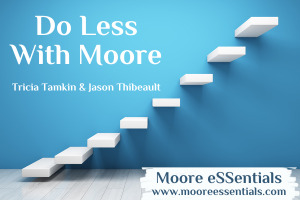Question: I do a lot of MPC business development calls. I am struggling with what to say to (1) a former client I have not talked with in a while and really don’t have a strong MPC and (2) what to say with no MPC to a brand-new client. -Sharon
The Power of Email in MPC Business Development
What we are finding, and one of the things we teach at our event, is that emailing to the same hiring manager the MPC presentation, closing with “What’s a good time for us to go into more depth on this candidate?” is a great strategy.
It is something you can use to get more people on the phone. It is not about teaching them to engage in a dialogue via email; it’s about getting them on the phone. We found many people with the Most Placeable Candidate (MPC) approach for business development are replying well to emails. I am not saying, Sharon, to stop your calls, especially if they don’t return the email; that is a great way to go in with the same presentation into a voicemail or to try to get them live.
Engaging Former Clients with Limited MPC Options
If you don’t have that most placeable candidate, I asked this question 20-something years ago when I started. I’d go, I have some good candidates, but I don’t have a great candidate right now.
Then my trainer at the time said, well, then you go to an OPC, an only placeable candidate. I had some candidates who looked really good on paper, but they may not interview well. You will know that in each one of your niches. Remember, you don’t need to place this candidate, the purpose is to get the hiring manager on the phone and diagnose their need.
That’s what I would recommend, Sharon, is take that above-average candidate who is not quite A+, might be B+, and find their biggest accomplishments as it relates to what you know your hiring managers want to hear about or the level of technical experience or technical knowledge, the alphabet soup, and use that.
Crafting Compelling Candidate Presentations
Remember, you want to come across as competent and strong, so you want to have really good language around that. My verbiage was always, “Hey Sharon, in a recent engaged search [by the way, if you have a signed fee agreement, that is an engaged search] I uncovered an individual who (fill in the blank with their biggest accomplishment). When’s a good time for us to go into more depth on this candidate?”
Not, “We specialize in the widget space; we started the business in 1972 with our founder, third-generation.” – Most people tune out.
“Sharon, Mike Gionta, in a recent engaged search, I uncovered an individual who is 173% of quota over the last year, and 87% of that was new business development.” Boom, boom. I hit two things the VP of Sales will actually care about.
Find out what that is in your above-average candidate and use that to get them on the phone. I would do that with a brand-new client, too. Find the best available candidate to market to somebody.
Insights from Hiring Managers and HR Professionals
I have interviewed hiring managers, conducted panels with hiring managers at conferences. I have conducted panel interviews with HR people outside my niche.
When I asked, what do you want to hear on a marketing call from recruiters? My recent research validates this. Nothing has changed. We want to hear about talent. We might sound annoyed every once in a while, but we always want to hear about talent.
I asked, when we present talent, and you don’t call us back. And the response was, when you present talent, I don’t necessarily need it, but I like that I heard about it.
The little subtlety here, Sharon, is even if you are leaving it in a voicemail or an email, you are marketing that you are the source of this type of talent. It’s keeping you top of mind even when they don’t need you.
Fantastic question. Thank you very much. If you like what you heard and you want to learn more go to therecruiteru.com.
Mike Gionta & his company, The RecruiterU are sought out by solo recruiters and recruiting firm owners who want more revenues, better clients, great recruiters, etc.





